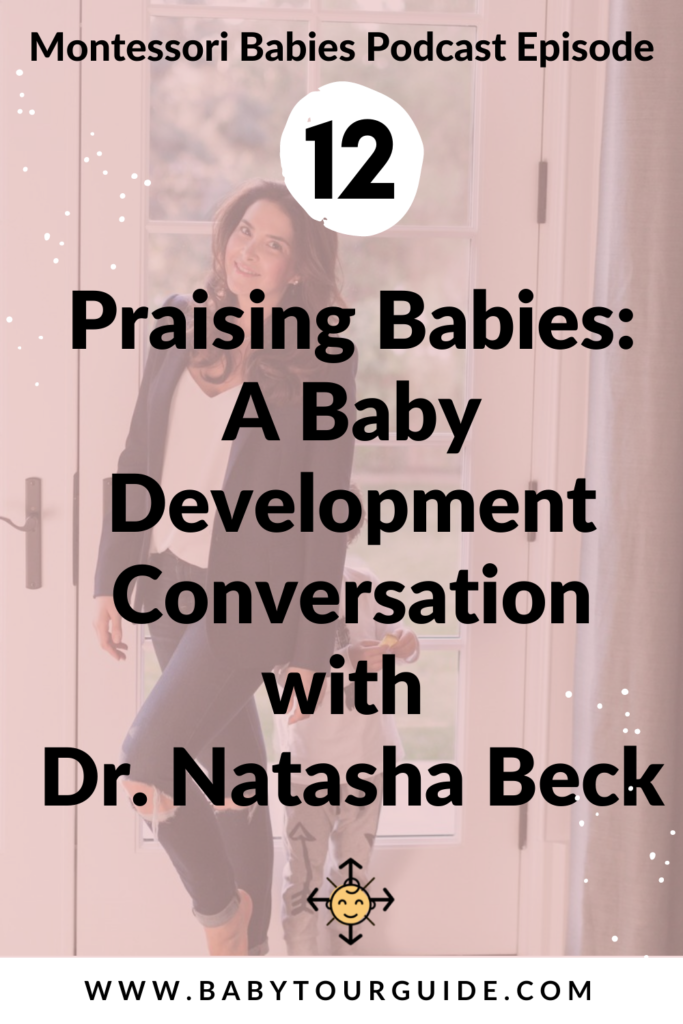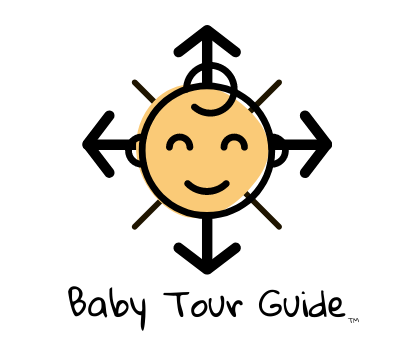This week I had the honor of interviewing the amazing Dr. Natasha Beck for our Montessori Babies podcast! She happens to also be known to parenting world as Dr. Organic Mommy. She is a parenting expert and healthy living advocate who has a wonderful mission to share her expertise and experience with other parents to help support their parenting journeys!
We had the most amazing conversation about praising babies. And the topic of our approach to praising kids is huge in the world of child development! When I was obtaining my undergrad degree in child development, we studied our language approach to praise as both parents and educators and lemme tell ya… what I studied is exactly what Dr. Beck recommended!
I have added some of our conversation about Praise below. Within our Montessori Babies interview, she offered so much helpful info about healthy living and just how she became so passionate about this field! I added some of our conversation about praising children to this post. If you’re interested in listening to our entire conversation or learning more about Dr. Beck’s mission and history, take a listen to episode below or check out her website at www.drorganicmommy.com.
Praising Babies: A Conversation with Dr. Natasha Beck
Bianca: One of the pieces that you had written really stuck out to me on your Instagram, actually, and that was your post about praise. And so I was hoping you could talk to our audience a little bit about, I guess starting with what praise even is what it looks like with infants and toddlers, and then the approach of how we can adjust our approach to help the child.
Dr. Beck: So excited about this topic and so passionate about it! I think praise I mean, you’ve got to look at ways that there’s different types of there’s external praise words. There’s an external reinforcement like saying, good job, you’ve got your punishments, you got your reward charts. And there’s so much in our culture in America, in America which people don’t realize that we everywhere else in the world, they don’t actually praise their children like we do.
And I would bet you would be shocked if you actually took a journal and wrote down how many times not only you, but anybody else, any other adult is around your child, how often they get praised. “You did a good job! Oh, you put on your shoe, you opened the door.” Anything that people praise for and what that’s doing to our children, you know?
And so the important thing is when you overpraise, it actually weakens that intrinsic motivation. What’s inside you? You want your child to be proud of themselves, to feel on their own that they did something. Because if they’re constantly looking for you, and that’s going to fizzle out.

Suggestions To Do Instead of Praising Your Baby
Dr. Beck: There’s a difference between praising your child, because I know people are going to ask this, well, how do I reinforce the good behavior? What do I do? You want your child to own up to it and be different?
There’s a difference between praise and acknowledgement. I want you to acknowledge but not praise. Simple, simple, nod, a smile is my favorite word. You don’t say much. Children really know what you’re feeling. They pick up on it.
And when you just lay out the “good jobs” all the time, it doesn’t feel genuine, right? They feel that and they get it. And so they become less motivated over time. And people don’t realize that when you’re overpraising, you’re causing a child to actually be less helpful, to be less of a of a contributor to your family because they don’t feel the need to.
And the other thing that does if you’re constantly praising and you have multiple children, it causes a lot of competition between them because who’s going to get Mom and Dad’s attention? Depending on your family constellation? I’m going to fight for it or I’m going to then I want more of it. And it causes competition.
Fostering Our Babies’ Innate Will To Learn
Bianca: You know, that’s actually a really good piece to point out is the you know, when you’re working with multiple children and you’re praising one and another is doing something else. That’s that’s a piece that I actually haven’t spoken about yet. Really good point! One of the things that you mentioned is the intrinsic versus extrinsic motivation. And I would love for you to talk more about that. That’s a huge, huge topic in Montessori, you know, and so just fostering that innate well to learn.
Dr. Beck: Yeah, there’s been lots of studies on this. How do you get kids or even adults to be intrinsically motivated by something? So the first thing I tell parents is to stop controlling your kids. There’s this battle of who’s got the control. I need to tell my kids what to do and my kid wants to tell me what to do.
Let’s let go of that and work collaboratively. If you don’t work collaboratively with your child, how do you expect them to work collaboratively with anybody else? So I start with that. So you’re building your connection with your family, being a part of your family is really important.
….

Babies Have An Innate Inner Will To Learn and Try Things
Bianca: One of the things that I love about Montessori in general is just that we observe the child and we observe where their well drives them. Right? And so much of infancy and toddlerhood is them observing us, you know. And so what’s so cool about involving them in their day to day experiences and activities is that they really get to do that.
Dr. Beck: So even as a little one!
Bianca: They can one hundred percent! So do you have suggestions for parents as far as specific phrases that they can hold on to? Because, you know, especially with babies and toddlers, it’s really hard when they take their first steps to not say “good job, honey!” you know, do you have suggestions?
Dr. Beck: I think language is key. And I try to emphasize that on my page to provide sample scripts. For example, so within your child’s ready and sitting up, you know, they’re sitting up. You’re going to sit there next to them, clean their toys, you’re going to fold your clothes and let them put things in a basket. You know, they don’t need a good job. You’re putting things in the basket. Let go of that phrase and say just a simple thing like “you’re putting the balls in the basket”. Just be that sportscaster. Just narrate what they’re doing.
And then they can feel like they put the ball in the basket. Well, I did that and they can feel good inside! I often get asked, like when parents say, well, shouldn’t I say you should be so proud of yourself?
I actually don’t like that saying because that’s making an assumption. I don’t know if the child’s feeling proud that I don’t want to project my own feeling of being proud onto my child. Let them feel proud. Let them acknowledge it. And you do that by signaling. Yeah, I, I see you. And there doesn’t need to be so much, you know, parents and caregivers, they talk a lot, you know, and I get excited. I’m a talker! But I kind of slow back and take things in and figure out how much you’re projecting your own feelings onto your child.
How Can Praise Affect Development Down the Line?
Dr. Beck: Down the line when you’re going to ask them “I need you to clean up after yourself” I mean, like, why? If you’re going to constantly tell me, like, good job for everything, OK, well, I don’t get that good job anymore. Am I over it? They’re just going to not be as helpful over time. They lose that, you know, it’s like that constant high.
Eventually, you know, it fizzles out like you don’t get it anymore because over time it doesn’t work. Right? You’re not intrinsically motivated if you don’t feel good about something. No one wants to do something. If you’re even this is something an adult can relate to your job, you don’t feel good about your job yourself and you look like you’re doing a good job, like you’re not going to continue wanting to do that, you know? And over time, if you don’t, you know, if you don’t, you’re going to get the acknowledgement from your boss. That simple. You know, but you don’t need that. You need it inside. Otherwise you’re never going to stick with the job.
….
Bianca: I couldn’t agree with you more and especially especially for the infancy and toddler head phases as they’re unconscious learners. You know, one of the things that I like to say a lot on the show is that they’re little scientists. Right. So everything that they’re doing, even though to us it may be perceived as something they’re getting into stuff or, you know, they’re causing a ruckus, they’re making a mess, you know, but to them, they’re exploring, you know
Dr. Beck: So they’re exploring their environment and taking in as much stimulation. That’s natural. And they’re pleasant for them. And that’s what helps them grow.
….
And that was my conversation with the amazing Dr. Natasha Beck, also known as Dr. Organic Mommy!
Check out her website for more amazing information! (Linked Below)
And as always, I hope you found this information helpful to your Montessori practice with your sweet baby or toddler!
Xoxo,
Bianca, Your Baby Tour Guide
